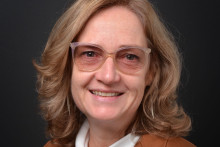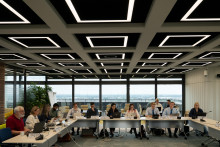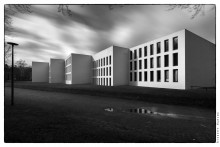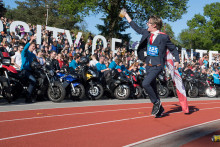The University Council recently came up with quite a list of recommendations, including on the provision of information and bottlenecks in PhD ceremonies. How do you view this?
'I see a very committed university council, with a heart for the cause of improving the university. That is a great good. I think that a central participation body is especially powerful when it thinks along and advises on the broad topics and outlines. What I found was that many recommendations were issued at a certain level of detail. If you focus too much on that as a central participation body, you may miss certain knowledge and context. I think that has happened here, in combination with big words. The term 'critical concern', for example, for something that refers to a summer recess.'
So some misunderstandings have arisen?
'Yes, despite the undoubtedly best intentions, I think the tone is a bit sharp. Critical concern is different from a point of attention. For example, it was about the waiting time to be able to defend a thesis. This is normally never six months. There is a careful procedure in place, in which a PhD committee is given six weeks to review a manuscript and a candidate is then given six weeks to make improvements. But what I think happened is that the University Council also included the summer holidays in the sum for the waiting time. Every university has that recess and committee members are never really to be found during such a period.'
So there are no capacity problems?
'No, if you add everything up, we have PhD defences forty weeks a year, with nineteen time slots a week. So you're talking about almost eight hundred promotions that you can schedule per year. Last year there were 238 PhDs, so we are nowhere near the maximum capacity. Of course, many would prefer to defend their thesis on Friday afternoon, but that is unfortunately not feasible.'
The letter does reveal worrying developments, such as hate mail to TGS staff. That seems quite worrisome, I’d say?
'I'm not shocked by it. There was recently a nuisance, for example in the Sports Center and the library. All support staff have to deal with rude behaviour, which is a society-wide tendency. In that sense, TGS is no different from other departments of the UT. Not to trivialize it, but this too has been put down in some heavy terms by the University Council.'
During the meeting, a 'us-versus-them culture' was mentioned, confirmed by the rector. Do you notice a kind of us-versus-them thinking of scientists towards TGS?
'There is a certain resistance somewhere. And I understand that people are frustrated when they don't see where the problem lies. Quality assurance by TGS is often mentioned in the same breath as having to do administration. People are quickly inclined to identify us with the tracking system Hora Finita. But monitoring and administration are a means of quality assurance, not a goal. Ultimately, that is the main task of TGS: we have to guarantee the value of the PhD programme and dissertations, because it is the highest possible diploma you can get. The fact that this quality is carefully guaranteed benefits everyone.'
Has it gone wrong somewhere in terms of image?
'Two developments coincided. First of all, there was a fuss about practices at Tilburg University, after which rectors sat down with each other and made national agreements. This included drawing up a training and supervision plan and working with a four-eyes principle; Each PhD student will have two supervisors. This also includes compulsory courses, for example to improve your so-called soft skills as a PhD student. The how and why of this was not communicated properly at the time, partly due to the outbreak of the coronavirus.'
'That development coincided with the introduction of the Hora Finita tracking system. We call it quality assurance, but the association attached to it is that of mandatory administration. In addition, Hora Finita – designed and developed at the University of Groningen – was never created as a process system to track people, but to register afterwards. We started introducing it at the UT as a workflow system. The system was never designed for that. That's why users now don't see where the ball is – who needs to take action on what. That feeds the frustration.'
Can a new system solve problems?
'We are working on that now. The LISA service department is currently developing a new system called Doctorate. We can now really have something tailor-made, to the wishes and requirements of everyone who works with it. The preliminary plan is that this new system can be put into use from 1 January 2026. My dream is that it becomes as clear as possible who is in charge of which step. That in the most literal sense of the word it becomes clear who the ball is with: the PhD student, the supervisor or the dean, for example. There are great opportunities with such a new system. I hope that LISA has the time and manpower to realize a system in which the finishing touches are made.'
You do not fully recognize yourself in the concerns of the University Council. What are your concerns – or points of attention?
'One of my concerns is the number of new PhD students. That number increased by more than a hundred last year. They all have to do the compulsory courses, but in the meantime we at TGS also have a target to save 10 percent on our budget. So we have to do more, with fewer resources. And then we have already had to say goodbye to external course providers because of the cutbacks. In addition, I am concerned about the availability of rooms, so that we are forced to move to many online courses. Our course offer receives an average rating of 8.5. I hope that we don't have to compromise on that quality and appreciation due to circumstances.'
Rector Tom Veldkamp announced a so-called tour of the fields, to explain more about the role and tasks of TGS. Is that supposed to clear up misunderstandings?
'I am indeed going to visit the faculties together with the rector. Because we want to work on the image and create clearer expectations. This concerns, for example, the mutual expectations and dependencies of PhD student and supervisor. But also about the role of TGS itself. We are an executive organization. It's not that we impose the rules. We implement the rules of the Doctorate Board – and they are in turn bound by the Higher Education and Research Act. If you want to deliver quality, there is also a background behind it. People need to realize that a PhD programme is more than a booklet with a few articles in it. It is an education in which you gain essential skills.'







